|
|
|
Sort Order |
|
|
|
Items / Page
|
|
|
|
|
|
|
| Srl | Item |
| 1 |
ID:
133428
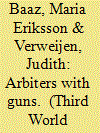

|
|
|
|
|
| Publication |
2014.
|
| Summary/Abstract |
Based on extensive field research in the Democratic Republic of the Congo (DR Congo), this article elucidates the logics, processes and readings surrounding certain 'extra-military' practices enacted by the Congolese army, namely the processing of various types of disputes between civilians. Exceeding the boundaries of the domain of 'public security', such activities are commonly categorised as 'corruption'. Yet such labelling, founded on a supposed clear-cut public-private divide, obscures the underlying processes and logics, in particular the fact that these practices are located on a blurred public-private spectrum and result from both civilian demand and military imposition. Furthermore, popular readings of military involvement in civilian disputes are highly ambiguous, simultaneously representing it as 'abnormal' and 'harmful', and normalising it as 'making sense' - reflecting the militarised institutional environment and the weakness of civilian authorities in the eastern DR Congo. Strengthening these authorities will be vital for reducing this practice, which has an enkindling effect on the dynamics of conflict and violence.
|
|
|
|
|
|
|
|
|
|
|
|
|
|
|
|
| 2 |
ID:
151615
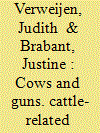

|
|
|
|
|
| Summary/Abstract |
This paper analyses the role of cattle in the entwined dynamics of conflict and violence in the Fizi and Itombwe region of South Kivu province, in the eastern Democratic Republic of the Congo. On the one hand, agropastoral conflict intensifies armed mobilisation, allowing armed groups to draw upon particular conflict narratives that generate popular and elite support. It also creates incentives for armed actors to engage in cattle-looting, or the defence against it, for both symbolic and material reasons. On the other hand, the presence of armed forces and the use of violence profoundly shape agropastoral conflicts. Importantly, they change the perceived stakes of these conflicts, and hamper their resolution. By showing that the relations between cattle-related conflict and armed activity are indirect, complex and mutual, the paper refines both theories on agropastoral conflict and those highlighting the role of local conflicts in fuelling violence in the eastern Congo.
|
|
|
|
|
|
|
|
|
|
|
|
|
|
|
|
| 3 |
ID:
165977


|
|
|
|
|
| Summary/Abstract |
Much of the recent literature on rebel governance and violent political orders works with ‘centred’ and instrumental understandings of power. In this view, power is seen as exercised over subjects, and as situated in rebel rulers, governance institutions, or ruling networks. Drawing on the study of the armed groups known as ‘Mai-Mai’ in eastern Democratic Republic of the Congo, this article instead adopts a governmentality perspective on rebel governance. It demonstrates how Mai-Mai groups rule not only through direct imposition but also, more subtly, by shaping people’s subjectivities and self-conduct. We identify four clusters of techniques of Mai-Mai rule that relate respectively to ethnicity and custom; spirituality; ‘stateness’; and patronage and protection. We argue that a governmentality perspective, with its focus on rationalities and practices of power, offers a fine-grained understanding of rebel rule that moves beyond common binaries such as coercion versus freedom. By showing its relevance for the analysis of rebel rule in the eastern Congo, our findings further strengthen the case for applying a governmentality perspective to non-Western political orders.
|
|
|
|
|
|
|
|
|
|
|
|
|
|
|
|
| 4 |
ID:
161541
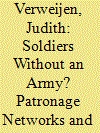

|
|
|
|
|
| Summary/Abstract |
This article analyzes the effects of patronage networks on cohesion in the Armed Forces of the Democratic Republic of the Congo. It shows that while patronage networks provide support to individual military personnel, they undermine both peer and commander–subordinate bonding. They promote unequal service conditions and statuses and link these to extra-unit and extra-military forms of social identification, which are further reinforced by soldiers’ living and generating revenue among civilians. Furthermore, they impair meritocracy and frustrate the extent to which commanders live up to their subordinates’ expectations. As they fuel internal conflicts, often around revenue generation, and foster bad service conditions and distrust toward the political and military leadership, patronage networks also undermine institutional cohesion. The article concludes that cohesion formation in the FARDC follows different patterns than in well-institutionalized and well-resourced militaries. Given that cohesion impacts combat performance and norm enforcement, these findings are relevant for defense reform efforts and military cooperation.
|
|
|
|
|
|
|
|
|
|
|
|
|
|
|
|
| 5 |
ID:
153526
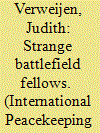

|
|
|
|
|
| Summary/Abstract |
The literature on peacekeeping has paid scant attention to the interaction between peacekeeping troops and host country military. Addressing this gap in scholarly knowledge, this paper conceptualizes such interaction as ‘diagonal interoperability’. The latter is situated in-between ‘horizontal interoperability’ on the one hand, relating to interaction between different components of a peacekeeping mission, and ‘vertical interoperability’ on the other, referring to the relations between international peacekeepers and ‘peace-kept’ populations. The paper focuses on the Democratic Republic of the Congo, where UN forces and the Congolese army are engaged in joint military operations and army reform is part of the peacekeeping mission’s mandate. Studying both mutual representations and joint practices, the paper explores the organizational, political, discursive, and security-related factors that shape diagonal interoperability. It concludes that diagonal interoperability between the two forces is weak, as reflected in mutual distrust and ‘not-so joint’ joint operations. Perhaps surprisingly, it finds that shared military identities do not seem to facilitate collaboration. Rather, mutual perceptions of the ‘military Other’ are infused with discourses of cultural and political difference, therefore accentuating the power asymmetries that undermine diagonal interoperability.
|
|
|
|
|
|
|
|
|
|
|
|
|
|
|
|
| 6 |
ID:
123503
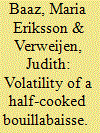

|
|
|
|
|
| Publication |
2013.
|
| Summary/Abstract |
In early 2012, Congolese army deserters formed the M23 rebel movement. This article analyses the insurgency and other armed group activity in the eastern DRC in the light of the politics of rebel-military integration. It argues that military integration processes have fuelled militarization in three main ways. First, by creating incentive structures promoting army desertion and insurgent violence; second, by fuelling inter- and intra-community conflicts; and third, by the further unmaking of an already unmade army. We argue that this is not merely the product of a 'lack of political will' on behalf of the DRC government, but must be understood in the light of the intricacies of Big Man politics and Kinshasa's weak grip over both the fragmented political-military landscape in the east and its own coercive arm. Demonstrating the link between military integration and militarization, the article concludes that these problems arise from the context and implementation of integration, rather than from the principle of military power sharing itself. It thus highlights the crucial agency of political-military entrepreneurs, as shaped by national-level policies, in the production of 'local violence'.
|
|
|
|
|
|
|
|
|
|
|
|
|
|
|
|
|
|
|
|
|